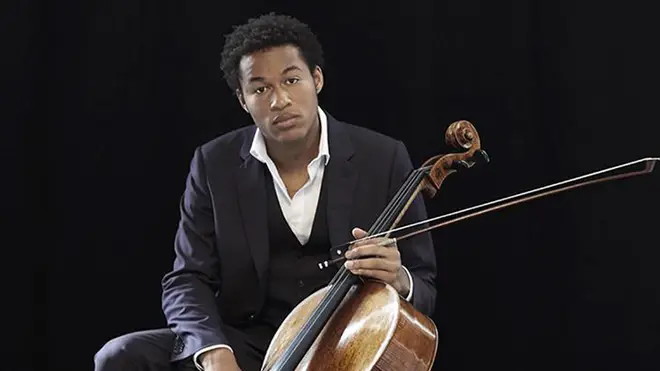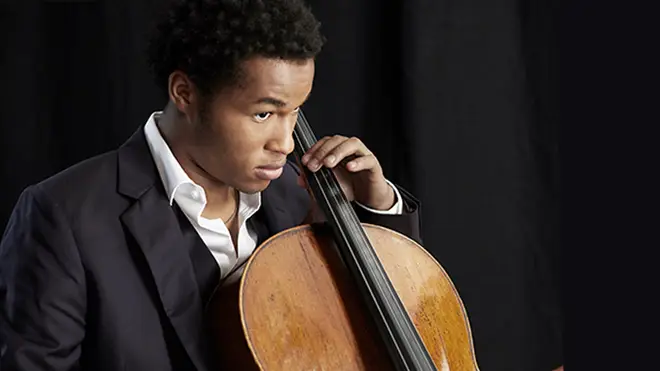On Air Now
Early Breakfast with Lucy Coward 4am - 6:30am
13 April 2021, 13:17 | Updated: 13 April 2021, 14:22

Sheku Kanneh-Mason: 'It's obvious there’s an extreme lack of diversity in classical music'
The star cellist tells Black Lives in Music of his love for Dvořák and Dr Dré, and how the ‘extreme’ lack of racial diversity in classical music is tightly bound with the dwindling presence of music in schools.
For so many young, Black, creative people sitting at home that day, seeing Sheku Kanneh-Mason bowing his cello for a televised audience of two billion people at the Duke of Duchess of Sussex’s Royal Wedding was a moment – a moment in which they saw a musician at the top of his game, who looked like themselves and their families.
“It’s very, very difficult to see yourself doing something if no-one who looks like you is doing it,” Sheku tells broadcaster Zeze Millz in an interview for Black Lives in Music, a new organisation supporting Black musicians and music creators in the UK.
“It’s very obvious there’s an extreme lack of diversity in classical music. But we’re already seeing some change – Black people are feeling like they can be up there in classical music.”
Sheku grew up in Nottingham with six siblings, all of whom – including the brilliant pianist Isata Kanneh-Mason – are exceptional musical talents.
“My parents [Stuart and Kadiatu Kanneh-Mason – read her interview on Classic FM here] were insistent on showing us role models when we were growing up, and of course there weren’t many or any that we knew of that were Black classical musicians.”

“We’d watch documentaries of Muhammad Ali, Bob Marley and read about great Black heroes, and we were so inspired by the notion that as a Black person, you can do anything,” the cellist adds.
Brilliantly, in 2020 it was found that the ‘Sheku effect’ was moving more young people than ever before to take up the cello. So, among numerous awards and playing to an audience of two billion, Sheku can now add to his accolades: inspiring a new generation of cellists.
“One of the most moving things for me, is when someone has been inspired to pick up the cello because of [one of my] performances,” Sheku tells Zeze, modestly. “It shows the power of watching something as a young person.”
Read more: Chi-chi Nwanoku: ‘Why do Black people have to be that much better to win an audition?’ >

Growing up, Sheku lived in a house of music (aptly, the title of his mother’s book). There was mostly always classical music playing – but his parents, Sheku says, also had a deep love for reggae and Bob Marley.
Millz asks, if you could work with anyone, dead or alive, from any genre, who would it be? “Bob Marley,” replies Sheku, who in 2018, released a delightfully inventive arrangement of ‘No Woman No Cry’ for virtuoso cello.
“I love Marley’s approach to life and to music,” Sheku adds. “I would be so moved by being in his presence. Even when I’m playing a piece of classical music, I feel influenced by how Marley performs.”
Sheku also recalls listening to some 50 Cent, Snoop Dogg and Dr Dré with his siblings. “I think Dr Dré is a genius,” he adds. “I’m not sure a collaboration would work so well, but I’d like to chat to him.”

Sheku Kanneh-Mason plays 'No Woman No Cry'
It’s clear that for Sheku, great music is great music, no matter the genre. And the young cellist has been vocal about the relevance of putting music at the heart of all children’s lives, no matter their background.
“I was extremely lucky to have gone to schools where music was very much a part of the education,” he says. “I remember coming into assemblies in primary school to the Bach Cello Suites and Dvořák ‘New World’ Symphony, because the headteacher just loved music.
“We’d always sing, and we had music nights every term where parents and students would perform. We were always surrounded by a love of music at school. It was just a state school in Nottingham, but the headteacher saw the obvious value of having music as a big part of childhood.”
Read more: Musicians who play from a young age have more ‘connected’ brains, study finds >
And are opportunities for young Black musicians getting better, Zeze asks? “No,” Sheku shakes his head, to Zeze’s surprise. “The cuts that have been [made] to music at my primary school have been devastating – and as a result, there are few children who are able to have this music education,” the cellist explains.
“You create this two-class thing where those able to pay for music lessons are able to become musicians and be enriched by these wonderful experiences. There’s a massive divide in this country in opportunities. It highlights a really big problem in this country.”
Black Lives in Music is calling for Black musicians and music creators in Britain to take part in ground-breaking research, which will be used to bring about representation and participation for a diverse and inclusive industry. Enter the survey here.